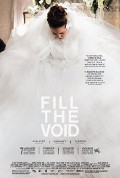
Israel 2012
Directed by
Rama Burshtein
90 minutes
Rated G
Reviewed by
Sharon Hurst

Fill The Void
Synopsis: Shira (Hadas Yaron) is the 18-year-old daughter, one of three, in an ultra-orthodox Jewish Hasidic family in Tel Aviv. As arranged by her parents she is engaged in marriage to a man unknown to her but considered a great prospect. When Shira’s older sister, Esther, dies in childbirth, a huge dilemma arises. An eager widow awaits in Belgium to marry the widower Yochay (Yiftak Klein). But Shira’s mother Rivka (Irit Sheleg) doesn’t wish her only grandchild to be whisked away and so suggests a match between Shira and her much older brother-in-law.
This gentle gem of a film gives a glimpse into a seldom-seen closed community and as a wedding film it is a million miles from the usual Hollywood style rom-com. The director who comes from just such a community draws on a real life incident with the aim of exploring common denominators of the heart. I believe she succeeds. Although I am very uncomfortable with religious ritual, especially by the depth of religiosity portrayed here, the common human bond we all share comes through loud and clear.
Whilst this world is strangely fascinating, the characters are almost familiar, as if somehow akin to those of a Jane Austen novel, where rites and social expectations also rule. The story arc of this film also is not dissimilar to that of many an Austen novel. The emphasis on how important it is to marry is huge, and because older sister Frieda (Hila Feldman) is still on the shelf, Shira feels obliged to speak up and suggest Yochay should marry her instead. Whilst many feminists might see this type of society as being repressive of women in many ways the women come across with their own brand of strength.
Most of the story takes place within a single home, with only brief excursions to the synagogue or the rabbi’s office. The lighting is sublime, close-ups transfixing, and while both Yochay and Shira look about as conservative as you can get, one in dowdy cardigans and the other with his sidelocks and hat, we still sense some chemistry and attraction between them. As married women must cover their hair, there is an array of colourful turbans that break the soft sepia overtones. The moments of great joy, involving dancing and news of impending weddings burst out like shiny jewels amongst all the cloistered conservatism. Something incandescent and mysterious seems to emerge, almost as if there is a spiritual presence wherever these people go. Overhead shots, such as when the new baby is carried in for his circumcision, seem to convey the divine. It is indeed something rarely seen on film. Add the beautiful accordion music, so archetypally Jewish, that Shira plays and you get touched in a way not imagined.
The actual values espoused may seem restrictive for some and yet no-one could fail to see how embracing and secure it could be within the folds of such a community. The protection of family, the emphasis upon traditional caring values – all these are almost vanishing in much of today’s world.
The rabbi (Shira’s father) dispenses favours, both advisory and financial, to his flock, while Shira’s unmarried aunt meddles in everyone’s business, but has to be hand-fed as she has no arms.
The performances of Klein and Yaron are notable; Yaron won Best Actress at Venice 2012 for her role. The film scooped just about every award and nomination at the Israeli Film Academy Awards, along with a lot of other accolades at various film festivals.
I am wondering whether viewers with no knowledge of Jewish orthodoxy will find it all a bit confusing, as the film doesn’t explain anything at all regarding the religious context. However, as with the best movies, if you just open yourself up to it, Fill The Void should provide a very rewarding experience.

Want more about this film?


Want something different?




